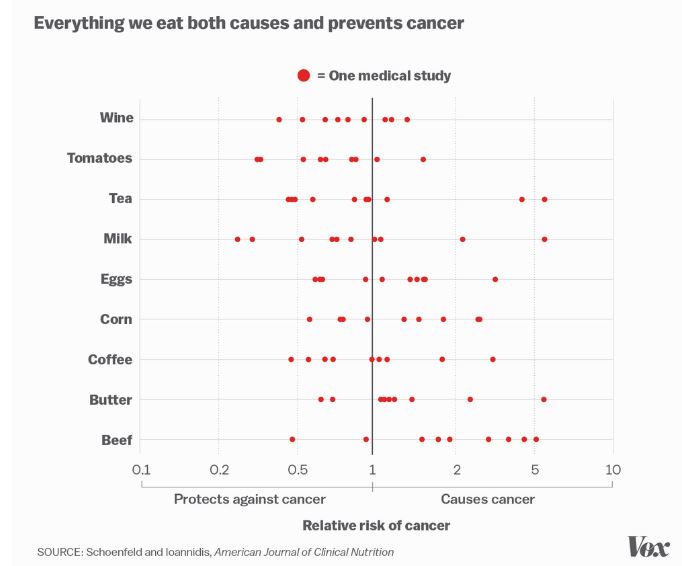This was an occupation once so conservative and evidence-driven that they were the last to accept that heart disease and cancer might have a hereditary factor. When epidemiologists showed that smoking causes lung cancer the data were so overwhelming and comprehensive that Big Tobacco began to stockpile money for the inevitable lawsuits because they had denied it.
Then it all went bad. In the 1980s, led by the Harvard School of Public Health, epidemiologists began to leverage that goodwill among the public and used their cultural clout to promote an increasingly bizarre series of correlations about food and chemicals and diseases and 'longevity' using nothing but diaries of people.
So now epidemiologists routinely make claims like that pickles and chewing gum cause cancer.(1) The science world knows it isn't true, the public thinks it is crazy, but in a decade ago epidemiologists gained so much clout in the Obama administration - if science isn't on your side, find statistics - that government employees in the National Institute of Environmental Health Sciences began to declare that their correlation was a Supreme Court over science and that biologists, toxicologists, and chemists would simply have to figure out why the effects found in statistics were happening.(2)

In that culture, it was only a matter of time before epidemiologists claimed that losing weight causes cancer.(3)
It does not. Let's break it down.
The authors found that the 157, 474 participants had 15,809 cases of cancer - no shock when dealing with people up to age 70. What led to 'scientists are baffled'-type press were 1,362 cancer cases per 100,000 person-years for those with recent weight loss of greater than 10 percent but only compared with 869 cancer cases per 100,000 person-years among those without recent weight loss. Person years are the time the people spent in the study, so they framed it that way in order to make 493 cases per 100,000 person-years seem more alarming than it is. Tthe Nurses’ Health Study were women followed up from June 1978 until June 30, 2016, and men were from the Health Professionals Follow-Up Study from January 1988 until January 31, 2016. Both are a long time and there is a lot of good data in each. This just isn't it.
If you use person-years, the absolute numbers sound a lot, but if you use cases over the actual 38 years it isn't much at all. They literally had to come up with a way to declare statistical significance because in science, that would be dismissed as statistical wobble. Among experts in statistics they would dismiss it as 'noise.'
If they had used person-hours they could have declared a difference of 4,318,680 - stop losing weight or you'll get cancer! The Washington Post could've put in in their headline subtitled 'Women and minorities impacted most' and there'd be calls for a Congressional investigation and claims by activists that weight loss was always unhealthy but Big Diet bought off academics to get them to say losing weight was smart.

Nearly the exact same claim. From 2017. Every month some data dredging makes these claims, but that is strategy. Get enough of the same claims and they claim 'weight of evidence'
Outside the world of wacky epidemiologists, which is nearly all of them until the next generation comes along and thinks they entered an evidence-driven field and begins to tear down the elders who ruined everything, this would fall flat. Obesity is linked to lots of diseases, including cancer, but whereas salt and blood pressure are a rather circumstantial claim, that losing weight causes cancer is so ridiculous in its methodology I have to wonder if epidemiologists created it on a dare.
NOTES:
(1) The problem is that not all epidemiology is bad, it just all looks bad because epidemiologists, like any other academic field, rarely call out their own. It is an insider's friendly haven the way 1960s country clubs only dreamed about. The problem for the real world became obvious when the COVID-19 pandemic came along. At first they told people to relax because coronavirus is in the same family as the common cold. And the World Health Organisation and China said it was not a pandemic.
When both were shown to be wrong, instead of doing a reset they sided...against the guy who said China was lying and the World Health Organisation was wrong and we should cut travel. Because he was a Republican. In one month in 2020 there were 9,000 bizarre epidemiology papers written and the only one that got any critical attention was one positing that a drug WHO had deemed 'a miracle' might also help with COVID-19. Because a Republican cited it in an election year.
That's not how it's supposed to work but unfortunately it often does. Epidemiology is such a joke there is a spurious correlations website correlating all kinds of crazy things with as much legitimacy (statistical significance!) as IARC belief that a weedkiller can cause cancer in humans.
(2) The Biden administration dredged those bad scientific memories back up, going so far as to replace retiring government scientists inside EPA with epidemiologists, who then created "exposure" thresholds that have nothing to do with the evidence. But they can be found in statistics if you dredge long enough.
(3) I know, I know, epidemiologists will always right down at the bottom that they don't deal with causation, but you have read enough media kits written by IARC to know epidemiologists write 'linked to' and 'suggests' and 'correlated' and increased risk' to infer causation. Everyone knows they do it for media attention so like claims that 'communism is a great system, it is just never been tried' such academic parsing is a waste of time. When you read the quotes from epidemiologists doing this stuff, it is invariably including calls to action or expressions of concern, which is not what you do if you recognize your work is only EXPLORATORY and has no scientific relevance.




Comments